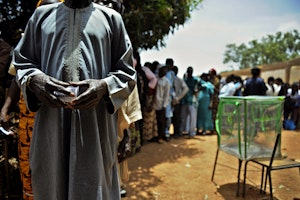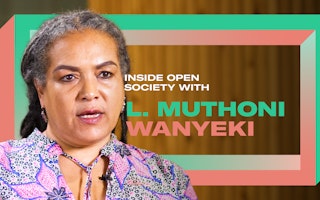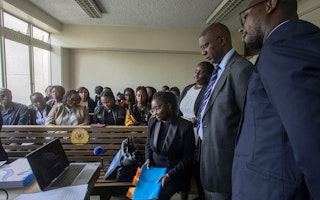Inside a Virtual “Situation Room” for West Africa’s Election Observers
By Mamadou Diallo

Over the last couple of decades, countries in West Africa have made notable improvements to their electoral processes. In 2017, those improvements will truly be put to the test. The region will witness at least a dozen elections, including presidential elections in Ghana, Liberia, and Cape Verde; gubernatorial elections in Nigeria; parliamentary elections in Ivory Coast and the Gambia; municipal elections in Guinea and Mali; and general elections in Niger, Senegal, and Sierra Leone.
Civil society’s contributions to improving the quality of elections have helped put the electoral process in the spotlight, and also increased accountability through evidence-based documentation of how elections are conducted in the region. Nevertheless, this traditional election observation model has its limitations; in particular, it is not designed to react in real time to irregularities on Election Day itself.
When irregularities are witnessed at polling stations—ballot stuffing, voter suppression, fraud by election officials—civil society groups often find themselves reporting on the breaches of election rules in the aftermath. The fact that they are not equipped to respond with immediate corrective action can trigger electoral emergencies in fragile or emerging democracies.
Four years ago, the Open Society Initiative for West Africa and its partners developed an election observation model called the Election Situation Room (ESR). This model enabled information sharing among civil society groups working on elections to enhance collaboration, advocacy, and rapid response to any electoral problems. As information comes in from the field via the ESR platform, civil society representatives analyze it and issue warnings and make recommendations to ensure the credibility and success of the electoral process.
Civil society is well placed to help election management bodies prevent or limit major election fraud, or events capable of triggering violence. The ESR model was successfully piloted during elections in Cote d’Ivoire, Guinea, Liberia, Mali, and Nigeria.
Election observation traditionally involves documenting events happening during the election and presenting an official report at the end, with recommendations on how to improve the process. The ESR model, by contrast, ensures that beyond observation, civil society can play a greater role in crisis management, emergency forecasting, and constructive engagement to ensure credible elections. In addition, the platform allows organizations to compile data generated from the field, lending the tool an analysis and advocacy component.
The ESR was first implemented in Nigeria, where a broad coalition of civil society groups came together during the April 2011 general elections to provide a more effective response to the threat of fraud and violence. Members of the ESR met at different stages of the election with the Election Management Body to review and discuss the level of preparedness, and to help clarify and provide any additional information on election coordination.
That same year during the general elections in Liberia, the Congress for Democratic Change—the expected winner—refused to accept the results when it lost, triggering fears of civil unrest. The party leadership were not very receptive of civil society engagement, prompting the ESR to reach out to elder statesmen, representatives from the Economic Community of West African States, and other members of the international community for assistance in urging the party leadership to reconsider their position.
In Senegal and Guinea, a coordinating platform of civil society representatives met regularly during the period of their presidential elections in 2012 and 2015 respectively. They analyzed information coming from the field, provided early warnings, and made immediate recommendations to ensure the credibility and success of the electoral process. In the case of Senegal, the platform paid special attention to electoral violence.
Key contributing factors to the success of the model in these countries include, first and foremost, the authority and respect that the facilitators of the process have gained within the civil society community. Second, though the ESR model can be implemented by any group, these facilitators have the technical know-how, the capacity, and the credibility to drive the process and host the platform. Third, at the heart of the model is a collaborative approach that allows for the balance of diverse opinions with the common goal of free and fair elections. Finally, the ESR’s focus is not on criticizing the process, but ensuring that elections are credible—hence the need to cultivate constructive relations with election management entities and other relevant government structures, especially security agencies.
To make the ESR model available to a wider audience and strengthen its potential as an instrument for election prevention and mitigation, we supported the development and design of an ESR toolkit. The free toolkit consists of a training curriculum on the implementation of the ESR and software called the OpenESR, which collects and processes data.
As the region gears up for upcoming elections, there is no doubt that the ESR toolkit will play a defining role in aiding the collaboration of civil society organizations to ensure freer and fairer elections in West Africa.
Mamadou Diallo is the Guinea program coordinator for the Open Society Initiative for West Africa.


